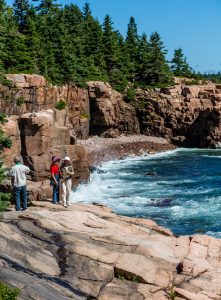
U.S. Sen. Susan Collins (R-ME) on Friday fought against the Department of Interior’s recent decision to nearly triple user fees at 17 national parks and offered alternative solutions to the challenge of how to pay for a large maintenance backlog in the park system.
The department has proposed increasing the cost of park passes for private vehicles from $25 to $70 at the national parks, including Maine’s Acadia National Park. Collins and U.S. Sen. Angus King (I-ME) said the increase in fees could hurt tourism and outlined other ways to address funding shortfalls in a letter to Department of Interior Secretary Ryan Zinke.
Describing Acadia National Park as one of the park system’s “crown jewels,” the senators noted that from May through October millions of visitors are drawn to it each year.
“Like most other parks, Acadia has felt the strain of the maintenance backlog, in part due to this sustained visitation,” the senators wrote. “While we recognize that this proposal would bring additional revenue to the park, we are not certain that this would either solve the problem or outweigh the risk to the local community of making the park more difficult to visit.”
The increased fee schedule is projected to generate approximately $70 million each year, according to the National Park Service. But Collins and King noted that the higher fees would not solve the funding shortfalls on a long-term basis.
The maintenance backlog for the National Park System had grown to nearly $12 billion at the start of 2017, and the National Park Service fiscal year 2018 budget request proposed cutting $200 million from its operations budget and reducing maintenance funding by $93 million, the letter said.
“We should keep in mind that the American people already pay for the maintenance of the National Park System through their tax dollars; if we are going to ask them directly for a greater contribution to the parks, it should be commensurate with service or more clearly justified than this proposal,” the letter stated.
The lawmakers have advocated for the National Park Service to make improvements to its system, such as by using technology to reduce operational costs, and to enable online and mobile park sales to make the buying passes easier for visitors.
Collins has also supported bipartisan measures that would reduce the backlog of high-priority maintenance needs at the parks.
Collins, a member of the Senate Appropriations Committee, and King both cosponsored the National Park Service Legacy Act, which would direct excess mineral revenues to a park service restoration fund each year. The revenues would start at $50 million a year and would increase to $500 million by 2027.
“… Before taking the action of raising fees to this degree, we strongly urge you to consider all available options and to consider the full breadth of the impact of this action on Acadia and the other parks,” the senators wrote.



